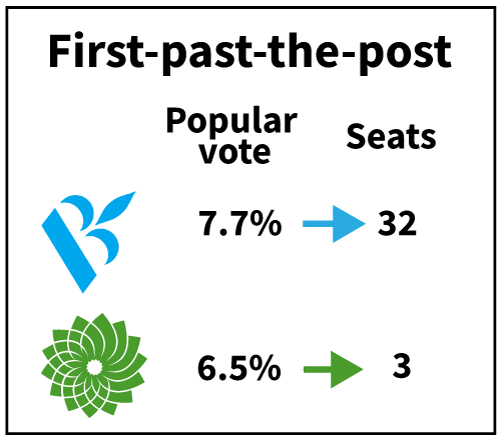On Taxation and Electoral Modernisation
Ray's most recent article calls for modernizing Canada’s outdated taxation and electoral systems—both over a century old. These systems no longer reflect the needs of 21st-century Canadians and fuel frustration and division in our politics. It's time for better governance, fairer representation, and reforms that meet today’s challenges.


The Electoral System: A Cycle of Disillusionment and Reversal
Take a moment to reflect on the flaws of our current electoral system. Highlighted by a provincial election in New Brunswick from the early 2000s. The Liberal party secured 51% of the vote and took 100% of the parliamentary seats. This left 49% of voters completely voiceless for four years. When the subsequent election came around, the Conservatives took over, only to reverse many of the policies the Liberals had implemented. This cycle of political whiplash, where one government undoes the policies of the previous one, leads to an unstable political climate where nothing gets done sustainably. The result? Canadians become disillusioned, angry, and frustrated, and the political system becomes a source of division rather than unity.
This back-and-forth between governments is a pattern we’ve seen play out across Canada, in every province and territory, and at the national level. When policies are reversed with each new government, it costs taxpayers billions of dollars. This wasteful process leads to confusion among the public about which government championed which policy, undermining trust in both politicians and the political process as a whole. Government workers are often caught in this endless cycle of change, struggling with low morale and reduced productivity. As a result, Canada’s political system struggles to achieve long-term objectives and falls behind in global competitiveness. If we’re serious about improving Canada’s productivity, we need a system that promotes stability and consistency, not constant policy reversal.
Modernizing our electoral system is the most positive solution I see. Today, nearly all electoral reform proposals suggest systems that better represent the diversity of views in our country, ensuring that more voices are heard at the decision-making table. This shift would lead to more balanced legislation, where policies are passed through broad consensus and are not dominated by one or two political parties. In a more representative system, the policies of one government wouldn’t be so easily undone by the next, leading to greater stability and trust.
Moreover, electoral modernization would make voting more meaningful. With a system that ensures more voices are represented, voters will feel like their opinions truly matter, increasing voter turnout and engagement. When people believe that their vote counts, they are more likely to participate in elections, restoring faith in the political process. If we remove barriers to voting, such as complicated registration processes or inaccessible polling locations, we will see even higher levels of engagement. This would have a positive feedback loop—more voters engaged means a stronger democracy, and ultimately, more sustainable governance that respects all Canadians.
The Taxation System: Outdated, Unfair, and Overwhelming
Canada’s taxation system, established in 1917, is similarly in dire need of modernization. While it has undergone many changes over the years, most of them have been small adjustments or concessions made through complicated legislative processes, with many provisions watered down to get bills passed. The system is a patchwork of old laws that no longer serve the needs of modern Canadians. The personal income tax form alone now stretches over 800 lines—an absurdly complicated and convoluted system. I’ve seen this firsthand. My own summarized version of my tax return is 30 pages long! And it’s not just the complexity; it’s the inefficiency and inequity built into the system that needs urgent attention.
One of the most glaring issues is how the system treats small businesses. Canada’s small businesses are crucial to the economy, yet the tax code offers little recognition of their vital role. Small business owners often have to put up their homes as collateral for loans and shoulder enormous personal risk in order to fund their businesses. Despite this, the tax system treats them as if they were large corporations, forcing them to jump through hoops and submit paperwork that doesn’t always make sense for their operations.
Small business owners frequently find themselves on the phone with the Canada Revenue Agency (CRA), navigating a maze of quarterly tax installments based on past returns, rather than current conditions. They must submit formal balance sheets and income statements even if they are running a one-person operation, and often have to hire expensive accountants just to remain compliant. This creates a major barrier for many people who might otherwise consider starting their own business. The rewards simply aren’t worth the hassle, and the stress can be overwhelming. In effect, Canada’s tax system discourages entrepreneurship, a fatal flaw given the importance of small businesses to our economy.
At the same time, the wealth disparity in Canada is growing at an alarming rate. Today, 30% of Canadians earn less than $40,000 a year, while the wealthiest 20% hold 66% of the country’s wealth, and the top 1% controls 20%. This stark inequality is compounded by the fact that the tax code itself is structured in ways that benefit the wealthiest individuals and corporations. The top personal income tax rate in Canada applies to individuals making $150,000 and above, yet more than a million Canadians earn more than that threshold. Meanwhile, corporations in Canada pay less tax than individual citizens, often using tax havens and loopholes to minimize their tax bills. Many of these corporations, which could be paying their fair share of taxes, exploit systems that allow them to shift money to other jurisdictions with lower tax rates. The result is that everyday Canadians are left holding the bag, while the wealthiest continue to dodge their tax responsibilities.
The taxation system also fails to account for the full environmental and social costs of many businesses. Take cigarettes, for example—companies that produce harmful products should bear the costs associated with those products, such as public health and environmental costs. Instead, taxpayers pick up the tab. This is yet another example of how the current tax system is fundamentally unfair and out of step with modern needs.
The Need for Sustainable Governance
Both Canada’s electoral and taxation systems are outdated, inefficient, and increasingly unfair. These systems no longer reflect the realities of our society, and they certainly don’t serve the needs of Canadians in the 21st century. From rising inequality to stagnant productivity, Canadians are struggling, and our political and economic systems are failing to respond to those struggles. Canadians are frustrated, angry, and disillusioned—especially when they feel as though their voices aren’t being heard. This discontent has contributed to a rise in voter cynicism, and even to higher rates of crime, as people feel disconnected from the system that should be serving them.
What we need is a governance system that addresses the concerns of all Canadians. We need systems that focus on sustainability—on people, planet, and prosperity. This means modernizing our electoral system to ensure that every voice is heard and that policies are made in the best interest of all Canadians, not just the political elite. It also means reforming our taxation system to make it fairer, simpler, and more aligned with modern economic realities. These changes would foster a more inclusive, more just, and more prosperous Canada for all its citizens.
It’s time for a new approach to governance, one that can meet the challenges of the present and future. It’s time for sustainable governance focused on People, Planet, and Prosperity.


